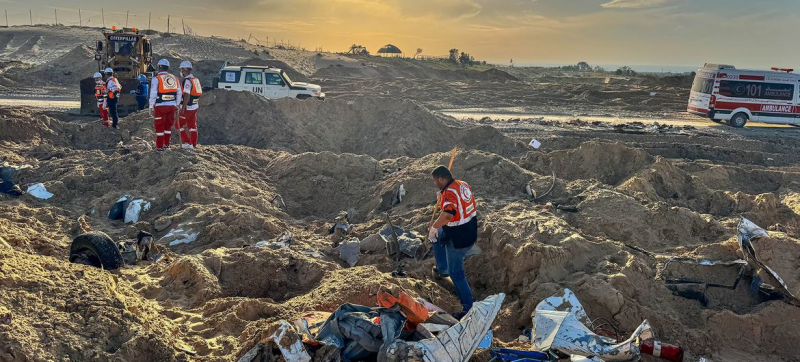- Nation Votes Tomorrow in 13th Poll, Referendum |
- Key in your hands, use it wisely: Prof Yunus tells voters |
- Yunus Urges Voters to Shape a ‘New Bangladesh’ |
- Bangladesh Polls: Campaign Ends as Voters Weigh Pledges |
- Bangladesh Heads to First Gen Z-Driven Competitive Poll |
Conflicts Escalate Attacks on Health and Aid Workers: UN

Rescue workers recover bodies of aid workers, including a UN staff member, in Tal Al Sultan in Gaza earlier this year. (file).
From Gaza to Sudan, wars are being waged on the very systems meant to protect civilian populations, with health workers, hospitals, health centres and ambulances targeted in alarming numbers, according to the UN agency for reproductive health and rights, UNFPA.
Attacks against health facilities doubled between 2023 and 2024, and more than 900 health workers were killed last year, the agency reported. Humanitarian aid workers were also killed in record numbers in 2024. Yet, 2025 is already outpacing even these grim statistics, at a time when funding for humanitarian work is shrinking and long-established support services are struggling to operate.
The nearly two-year-long war has devastated Gaza’s health system, leaving thousands without access to essential services. As famine takes hold, miscarriages, premature births and low birth weight cases have surged, while newborn deaths are rising, the UN agency warned.
“Because the delivery room was under direct fire, I delivered babies in hospital hallways,” said Ayda, a senior midwife in northern Gaza. “For lights, we used mobile phones. Despite the lack of supplies and water, our hands continued to work. Life must continue even when bombs are going off.”
Since October 2023, the World Health Organization (WHO) has documented over 720 attacks on healthcare in Gaza, with at least 1,580 health workers killed and an unknown number arrested and detained by Israel. Among them was Ayda, who, just days after sharing her story, was killed in an airstrike along with 37 members of her family.
In the rubble of the former Ibrahim Malik Hospital in Khartoum, Dr Khalid Badreldin, a reproductive health analyst with UNFPA in Sudan, recalled performing his first surgery and delivering his first baby there.
“Now, I find it like this,” he said, lamenting the shuttered hospital that was once a major provider of emergency treatment and maternal services. The hospital has joined more than 80 per cent of health facilities in Sudan’s conflict zones that are no longer operational.
Meanwhile, midwives in Khartoum are taking “huge risks to reach women in their homes,” explained Hawaa Ismael, who works at the UNFPA-supported Kararai Health Centre. “It was exhausting, working day and night, but it’s our duty, and I’m proud of what we’ve done.”
Elsewhere, staff at El Fasher Maternity Hospital have come under attack, with one midwife killed when her home was shelled and another kidnapped.
Clinics and hospitals have been deliberately targeted in Haiti’s spiralling crisis, weakening a health system already crippled after years of conflict, looting and financial collapse.
The State University Hospital, the country’s largest, was attacked at its reopening ceremony in December 2024, after a 10-month closure, with several people killed. That same month, armed gangs set fire to Bernard Mevs Hospital in Port-au-Prince, and in April, attacks forced Mirebalais University Hospital to close.
Organized gangs are waging a brutal campaign to seize control of the capital, with sexual violence rampant. An estimated 1.2 million women and girls are in urgent need of protection from gender-based violence, but due to insecurity, three of UNFPA’s four safe spaces in Port-au-Prince were recently forced to close and relocate. With emergency services extremely limited, only one quarter of rape survivors receive care within the critical 72-hour period.
Since January 2025, WHO has recorded over 300 Russian attacks on healthcare facilities, services and personnel in Ukraine, where women and girls often seek safer places to shelter and give birth.
“Every day brings stress,” said Anastasiia from Sloviansk. “Even if there’s no immediate strike, the fighting nearby is loud and constant. I was afraid to give birth, but life goes on. We want to live too.”
Her region lacks a neonatal intensive care unit and, while doctors can perform a Caesarean section, they cannot provide full care if complications arise. As her due date approached, Anastasiia travelled some 20km to reach the Kharkiv Regional Perinatal Centre, despite the city being regularly bombarded.
Response workers helping women like Anastasiia also face risks. “When we arrive at sites of attacks or violence, we don’t have time to slow down,” explained Roman, part of a UNFPA mobile psychosocial support team in Dnipro. “Only later do we realise how difficult it actually was.”
In eastern Democratic Republic of the Congo (DRC), most maternal healthcare facilities have been bombed or looted. Only one third of hospitals and one in five health centres are functioning. UNFPA’s mobile health teams are often the only option for women.
Displaced since February 2023, Francine Toyata described travelling through “darkness and chaos” with her mother to reach a UNFPA-supported mobile clinic in North Kivu’s Rutshuru territory to give birth.
“It is for women like Francine that we do this work,” said Nelly, her midwife. But as the conflict escalates, even camps for displaced people are being bombed, while mobile clinics and listening centres have also been looted and destroyed.
“We were not safe,” Nelly added. “We need more support to meet these urgent needs.”

